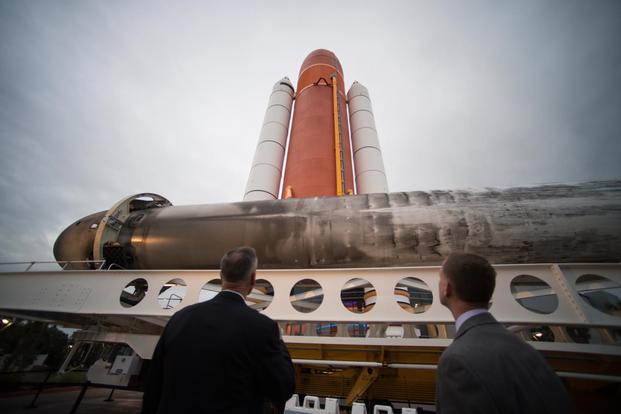The highly anticipated report due to Congress this week on how the Pentagon hopes to craft a future "'Space Force" has been delayed, officials said Tuesday.
"We are in the final coordination stages of the report to Congress on the recommended organization and management structure of space components for the Department of Defense," Army Lt. Col. Jamie Davis, a Pentagon spokesman, said in an email. "We will release the report when coordination is complete, which we anticipate will be soon."
Deputy Secretary of Defense Patrick Shanahan, whose office is overseeing the report, was expected to deliver the Pentagon's plan to lawmakers Aug. 1. An official said on background that the report will likely be a few days to perhaps a week late.
The official said it is not believed the delay was caused by Tuesday's DefenseOne report that the Defense Department intends to create a new combatant command solely focused on space.
Related content:
- Former SecAF: Airmen Will Get Lost in 'Space Force'
- Creation of Trump's 'Space Force' May Take Years, Experts Say
- 'Space Force' Study to Be Ready by August: DoD Official
While creating a new, separate branch within the DoD, as ordered by the president, would require congressional approval, the Pentagon says it has the authority to create a combatant command, known as U.S. Space Command, according to a draft of the report obtained by DefenseOne.
The DoD would also create a "Space Operations Force" made up of military and civilian personnel from the Army, Navy, Air Force and Marine Corps, as well as a Space Development Agency to oversee the contracting process and procurement of new satellites, DefenseOne said, citing the report.
The latest news comes amid weeks of speculation of how the Trump administration plans to facilitate a brand-new branch dedicated to the space mission.
Following President Donald Trump's surprise call for a separate "Space Force" in front of Chairman of the Joint Chiefs Gen. Joseph Dunford last month, officials have been weighing how best to proceed with forming the proposed sixth military branch. It is unclear how involved the existing military services are with the process.
Trump in March revealed he had an idea for a "space force," or separate military service for space.
During a visit to troops at Marine Corps Air Station Miramar, California, Trump said, "Because we're doing a tremendous amount of work in space, maybe we need a new force. We'll call it the space force."
His comments came after months of deliberations between the Air Force and lawmakers on whether the service should stand up a new "Space Corps" in hopes of taking adversarial threats in space more seriously.
Air Force Chief of Staff Gen. David Goldfein, Air Force Secretary Heather Wilson and Defense Secretary Jim Mattis attempted to deter the idea, citing costliness and organizational challenges.
And while lawmakers ultimately removed language in the 2018 National Defense Authorization Act requiring such an overhaul of the Air Force's mission, they still required a study of the idea and backed changes to the management of the space cadre.
Former Air Force Secretary Deborah Lee James on Monday agreed with current leadership, saying a separate Space Force is not a good idea.
"My very short response is no. I do not believe that we should have a separate Space Force," James, the 23rd Air Force secretary, said during a panel Monday at the Brookings Institution, a think tank in Washington, D.C.
Instead, another combatant command solely focused on space would better serve the mission, she said.
"A military service trains, organizes and equips -- it doesn't war fight," James explained. "Combatant commands do the war fight. I would support a full-up, unified command, so it would be the equivalent of a [Strategic Command]. I would certainly support that going forward to focus solely on space ... that would really be the ticket for solving that everyone is mostly focused on."
-- Oriana Pawlyk can be reached at oriana.pawlyk@military.com. Follow her on Twitter at @Oriana0214.










